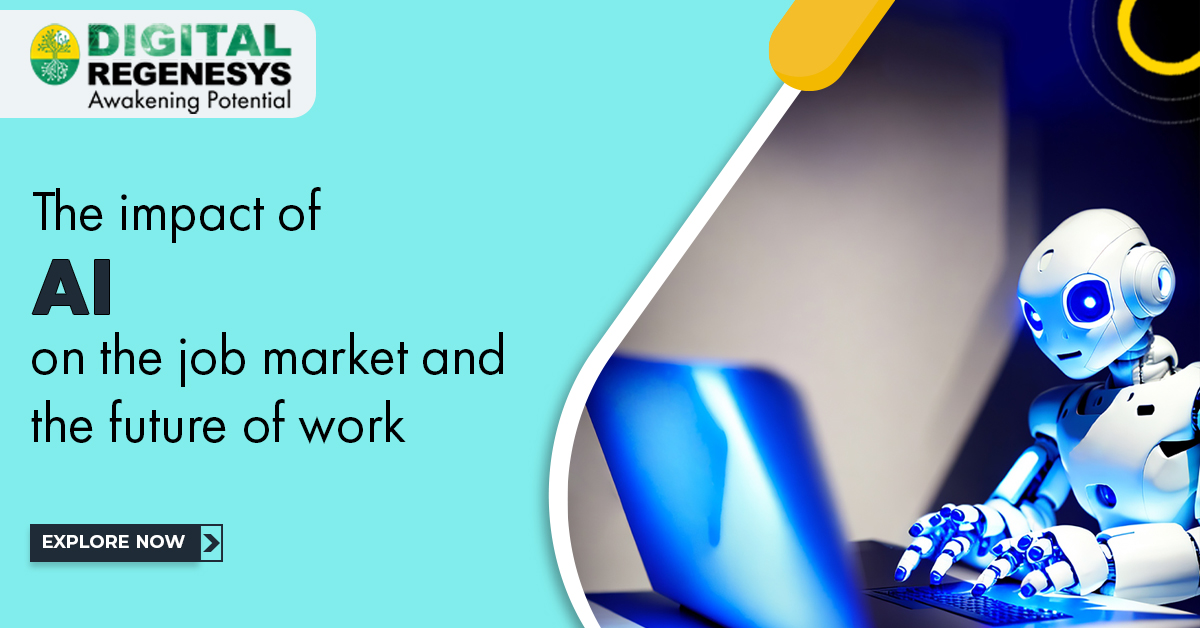The Impact Of AI On The Job Market And The Future Of Work

Navigating the AI Revolution: How it’s Reshaping the Job Market and the Future of Work.
Artificial Intelligence (AI) has been one of the most transformative technologies of the past few years.
From autonomous cars to voice assistants, AI systems are rapidly changing the way we live, work, and interact with one another. As AI continues to evolve and become more sophisticated, it raises crucial questions about the future of work and the job market.
While AI presents enormous opportunities, it also poses significant challenges. How will it impact employment and the economy?
How can individuals and organisations navigate this new reality and thrive in an AI-driven world?
In this article, let us explore the current state of AI technology and how it’s reshaping the job market.
Introduction to the AI Revolution and its Impact on the Job Market
The AI revolution is upon us, and its impact on the job market is undeniable. In recent years, Artificial Intelligence (AI) has advanced rapidly, changing different industries and the future of work. AI technologies like
- Automation,
- Machine learning,
- Advanced robotics and
- Natural language processing is transforming how businesses work and how tasks are done.
As AI becomes more sophisticated, many regular jobs are in danger of being overtaken by automation. Smart machines can efficiently do tasks that used to be done by humans. This change affects manual jobs and professional roles like
- Data entry,
- Customer service, and
- Parts of financial analysis.
While the fear of job loss is understandable, it’s important to note that the AI revolution also presents new opportunities. As specific jobs become obsolete, new roles require different skills.
The demand for professionals specialising in AI, machine learning, and data science is rising, creating a new job market.
Companies are looking for individuals who can:
- Create and manage AI systems,
- Analyse complicated data and
- Use AI technologies to enhance business processes and decision-making.
Moreover, AI transforms industries by augmenting human capabilities rather than replacing them entirely.
AI boosts productivity, precision, and efficiency in the healthcare, finance, and manufacturing sectors. This lets professionals concentrate on tasks demanding human intuition and creativity. By handling routine tasks, AI enables workers to focus on strategic and innovative endeavours.
Yet, as the AI revolution progresses, individuals must upskill and adapt to the changing job landscape.
To stay competitive in the job market, it is crucial to:
- Build a solid set of skills related to AI
- Staying updated with the latest developments
- Continuous learning and ongoing professional development.
These are vital for professionals to adapt to this changing landscape and maximise AI’s new opportunities.
Thus, continuous learning and ongoing professional development are vital for professionals to:
- Adapt to this changing landscape and
- Maximise AI’s new opportunities.
Also Read: Upskill And Upgrade With Artificial Intelligence Artificial Intelligence
The Rise of AI and Automation: What it Means for Jobs.
The rapid rise of artificial intelligence (AI) and automation is unprecedentedly reshaping the job market.
From self-driving cars to intelligent chatbots, AI technologies are revolutionising industries worldwide. While these advancements increase efficiency and productivity, they raise concerns about job security.
As automation progresses, machines take over routine and repetitive tasks, especially in manual or repetitive jobs. This can cause anxiety for people in these professions, fearing AI-powered systems might replace their jobs.
However, the rise of AI and automation also brings new opportunities. Automating mundane tasks allows employees to focus on more complex and creative aspects of their work. This shift creates new roles requiring unique human skills like creativity, critical thinking, and problem-solving.
As AI technology advances, there’s a growing demand for professionals who can develop, manage and maintain these systems. Industries such as:
- Robotics,
- Data science and
- Machine learning will be booming.
These industries offer new career paths for those with the necessary skills and knowledge.
Individuals must adapt and enhance their skills to thrive in this evolving job market. This involves:
Lifelong Learning:
Continuously learning and updating skills even after formal education.
Staying Updated:
Keeping current with technological advancements and understanding their impact on jobs.
Developing Complementary Skills:
Focusing on skills AI can’t easily replicate, such as
- Adaptability,
- Emotional intelligence,
- Complex problem-solving.
These human-centric skills will become increasingly valuable in this AI revolution as machines handle routine tasks, ensuring individuals stay competitive in the changing job landscape.
Jobs Most at Risk of Being Automated and Displaced by AI.
Artificial intelligence (AI) is changing how we work; some jobs are more vulnerable than others. AI can do repetitive tasks, doing jobs like data entry, cashiering, and customer service potentially at risk. Jobs in finance and healthcare that rely heavily on data analysis might be affected.
But here’s the thing: AI won’t necessarily wipe out entire jobs. Human qualities like critical thinking and emotional understanding are still crucial. AI will likely change these jobs, not eliminate them.
People in these at-risk jobs can prepare by learning new skills. Understanding data, programming, and creative problem-solving are valuable. Proactively embracing AI can open new job opportunities and help develop AI systems. Moreover, AI isn’t just taking jobs away; it’s creating new ones too.
How is AI Creating New Job Opportunities and Industries?
The growth of AI has led to a demand for experts in AI programming, machine learning, and data analysis. These professionals design and maintain AI systems.
AI has also given rise to entirely new industries. Fields like robotics, autonomous vehicles, and virtual reality are booming. These industries need various experts, from engineers to designers.
AI has even created jobs related to AI technology. For example, AI systems need carefully organised data. This has created jobs in data annotation and labelling, where people improve AI algorithms by sorting and categorising data. There’s also a need for experts in AI ethics and governance.
Furthermore, AI has empowered individuals to start their own businesses. With accessible AI tools, people can create unique solutions that cater to specific needs.
Strategies for Navigating the AI Revolution and Staying Relevant in the Job Market.
In this changing job landscape, staying relevant is essential. Here are some strategies:
Keep Learning:
- Continually update your skills.
- Take courses or workshops to stay updated with new trends and technologies.
Focus on Soft Skills:
- AI can’t replicate human skills like problem-solving and emotional intelligence.
- Sharpen these skills to stand out.
Embrace Technology:
- Don’t fear technology; use it to enhance your abilities.
- Learn how to use AI and automation to make your work more efficient.
Be Adaptable:
- Stay open to change.
- Embrace new opportunities, even if they seem unfamiliar.
- Develop a growth mindset to face challenges.
Network:
- Connect with colleagues, mentors, and industry experts.
- Your network can offer insights and job leads.
Emphasise Creativity:
- AI struggles with creativity.
- Cultivate innovative thinking and propose fresh ideas to remain valuable in the job market.
By following these strategies, you can navigate the changes AI brings and secure your place in the evolving job market. Embrace the opportunities AI offers, and keep growing in your career.

The Bottom Line
As artificial intelligence continues to advance, it is undeniably reshaping the job market and the future of work. Individuals can better prepare themselves for the changes ahead by understanding the potential impact of AI on different industries and job roles.
Embracing lifelong learning, adaptability, and cultivating human skills that AI cannot replicate will be crucial to thriving in the evolving job market. The AI revolution is here, and it’s up to us to navigate its path while harnessing its potential for a better future.
Stay tuned with Regenesys as we navigate the exciting and transformative world of AI and its profound influence on the future of work.
Enrol in the Digital Regenesys artificial intelligence online courses and upskill to thrive amidst the AI revolution, shaping industries globally.
At Digital Regenesys, artificial intelligence courses are available on three levels.
- Artificial Intelligence Introductory.
- Artificial Intelligence Intermediary.
- Artificial Intelligence Advanced Applied.
Enrol now and boost your career with artificial intelligence courses. Start exploring an array of artificial intelligence courses, online artificial intelligence courses, at Digital Regenesys.
FAQs on The Impact Of AI On The Job Market And The Future Of Work.
Last Updated: 23 August 2024
